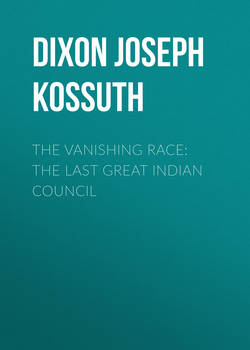Читать книгу The Vanishing Race: The Last Great Indian Council - Dixon Joseph Kossuth - Страница 15
THE STORY OF THE CHIEFS
Chief Running Bird
ОглавлениеTa-ne-haddle, Chief Running Bird, is an eminent leader of the Kiowa tribe now located in Oklahoma. His massive frame, lion-like head, and dignified bearing show few of the marks of the more than threescore years written upon his life. His very walk betokens supremacy and his constant demeanour assumes a spirit of generalship. His large head is set directly upon his shoulders, which seems to give no neck-play for his voice, which issues in harsh and guttural tones.
“In the old times when the Indians used to live in tepees like this,” he said, “when I was about eighteen years old, I began to go out with war parties. I have been in many wars, and lived in tents and tepees and moved from one place to another, and all this time I kept in good health. I remember a fight we had where there were thirty-eight Indians against four tribes. The battle began late in the evening and while the fight was raging high I thought I would never escape with my life. The enemy pressed us hotly, and finally we killed one of the chiefs, and then the Indians turned and left, and that saved our lives.”
The construction of our Indian camp on the banks of the Little Horn awakened in this man, as it did in all the Indians, a disposition to turn back to primitive conditions. Running Bird said: “I was very glad to come here and see the old-time tepees, the kind of tepees our fathers used to live in. I grew up to manhood myself in this kind of a tepee, and I had good health, and now when they give us a house to live in I am not healthy at all. The reason we cannot have good health in a house is because the Great Father gave us tepees to live in where we have plenty of air; we feel smothered in a house. When I came out and sleep in a tepee I can sleep a great deal better. I am getting old now, and am getting up in years, and all I wish at the present time is for my children to grow up industrious and work, because they cannot get honour in the war as I used to get it. They can only get honour by working hard. I cannot teach my children the way my father taught me, that the way to get honour was to go to war, but I can teach my children that the way to get honour is to go to work and be good men and women. I shall go home and tell the other Indians and our agent about you.”
And thus out of his gruff, austere, and soldier-like personality there issued words of a plain, homely philosophy that marks the path of success for all men. “The way to get honour is to go to work and be good men and women.”
